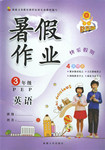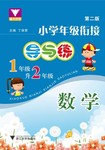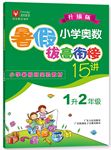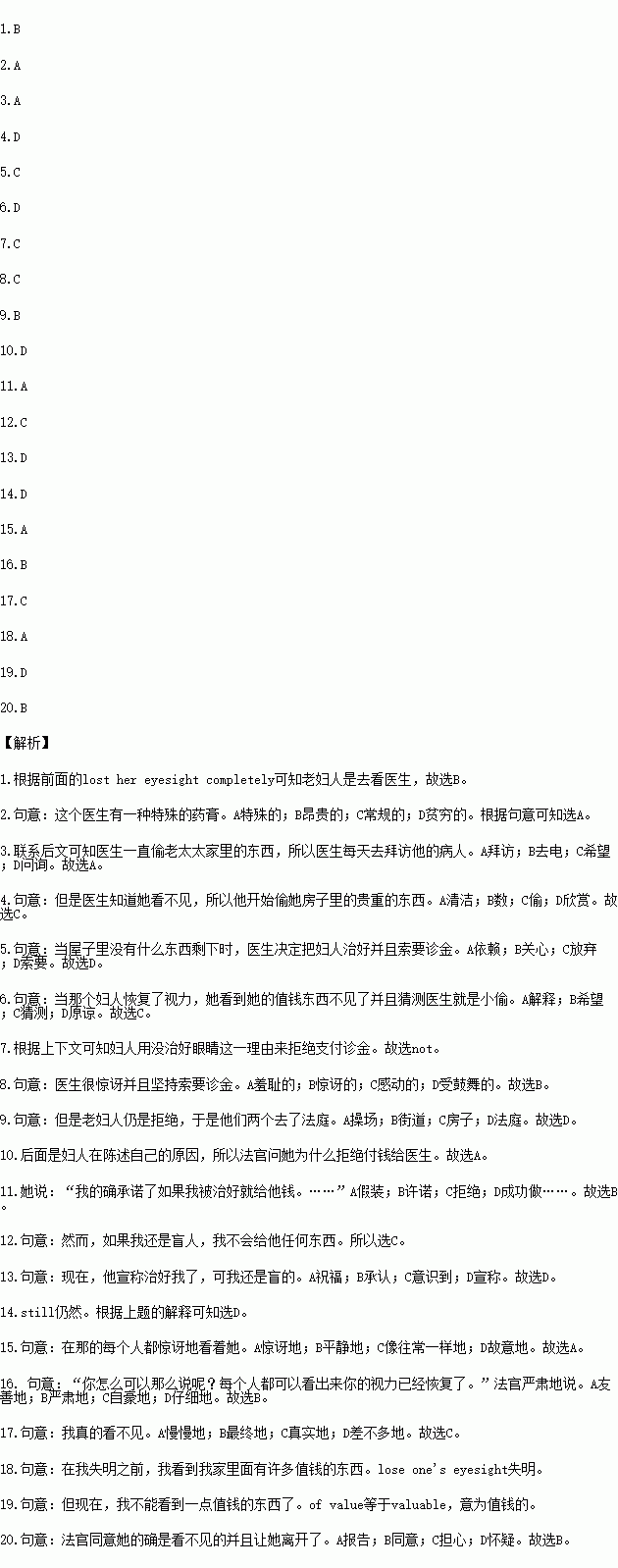题目内容
阅读下面短文,从短文后面各题所给的四个选项(A、 B、C 和 D)中选出可以填入空白处的最佳选项,并在答题卡上将该项涂黑。
An old woman had lost her eyesight completely, so she went to a to help her see again and made a bargain with him: if he could cure her, he would be paid well. But if he couldn’t, she would not pay him anything.
The doctor had a(an) ointment(药膏). When it was put on the eyes for a period of time, it restored the eyesight of anyone who was sightless.
The doctor began to his patient daily. But knowing that she couldn’t see, he started the valuables in her house. When there was nothing left, he decided to cure her and his payment.
When the woman recovered her eyesight, she saw that her valuables had gone and the doctor was the thief. So, saying that she was cured, she refused to pay him. The doctor was and he insisted on his fees. But the old woman refused and the two went to the .
The judge asked the old woman she refused to pay the doctor. She said, “I did to give him the money if I recovered my eyesight. However, if I remained blind, I was to give him . Now he that he has cured me, but I am blind.”
Everyone there looked at her . “ How can you say that? Everyone can see that your eyesight has been restored,” said the judge .
The old woman replied, “ I can’t see. Before I my eyesight, I had seen many valuable things in my house. But now, I am not able to see a thing of in it.”
The judge that she was indeed blind and let her go.
1.A. friend B. doctor C. teacher D. professor
2.A. special B. expensive C. regular D. poor
3.A. visit B. call C. expect D. question
4.A. cleaning B. counting C. stealing D. appreciating
5.A. depended on B. cared about C. gave up D. asked for
6.A. explained B. hoped C. guessed D. forgave
7.A. nearly B. once C. not D. well
8.A. ashamed B. surprised C. touched D. encouraged
9.A. playground B. street C. house D. court
10.A. why B. whether C. how D. when
11.A. pretend B. promise C. refuse D. manage
12.A. everything B. something C. nothing D. anything
13.A. wished B. admitted C. realized D. declared
14.A. quite B. ever C. even D. still
15.A. in surprise B. in peace C. as usual D. on purpose
16.A. friendly B. seriously C. proudly D. carefully
17.A. slowly B. finally C. really D. almost
18.A. lost B. failed C. had D. hurt
19.A. price B. meaning C. use D. value
20.A. reported B. agreed C. worried D. doubt
 学练快车道快乐假期暑假作业新疆人民出版社系列答案
学练快车道快乐假期暑假作业新疆人民出版社系列答案 浙大优学小学年级衔接导与练浙江大学出版社系列答案
浙大优学小学年级衔接导与练浙江大学出版社系列答案 小学暑假作业东南大学出版社系列答案
小学暑假作业东南大学出版社系列答案 津桥教育暑假拔高衔接广东人民出版社系列答案
津桥教育暑假拔高衔接广东人民出版社系列答案 波波熊暑假作业江西人民出版社系列答案
波波熊暑假作业江西人民出版社系列答案
